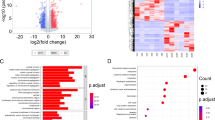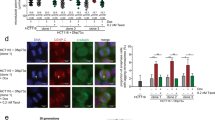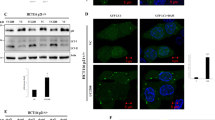Abstract
Aberrant centrosome numbers are detected in virtually all cancersincreasing the risk for cell division errors and chromosomal instability. Deregulation of the centrosome duplication cycle is considered as the major contributing factor for abnormal amplification of centrosomes. p21Waf1 and p27Kip1, general CDK inhibitors by inhibiting cyclin-dependent kinase 2 (CDK2)/cyclin E and cyclin A complexes, controlled the initiation and progress of centrosome duplication . We transfected p21 Waf1, p27 Kip1 or p21 Waf1- p27 Kip1 genes into MCF-7 cells by lipofection to explore the effect of the genes on centrosome duplication and proliferation of breast cancer cell. The result shows that the cell growth was obviously inhibited after being transfected, resulting in an accumulation of cells in G1 and the proportion of cells which contained abnormal centrosomes was obviously decreased. Comparing with p21 Waf1or p27 Kip1, the effects of p21Waf1- p27 Kip1 genes are more significative. These results suggest that p21Waf1 and p27Kip1 genes could inhibit the growth of human breast cancer cells and reverse abnormal duplication of centrosomes. p21Waf1 and p27Kip1 cooperate to regulate centrosome duplication and cell cycle progress, indicating p21 Waf1- p27 Kip1 combined gene might be potential therapeutic agents of breast cancer which reveals suppressed p21Waf1 and p27Kip1 expression.
Similar content being viewed by others
Article PDF
Author information
Authors and Affiliations
Corresponding author
Rights and permissions
About this article
Cite this article
Li, FN., Jiang, DD., Liu, XP. et al. Effect of p21Waf1 and p27Kip1 on centrosome replication and proliferation of breast cancer cell. Nat Prec (2010). https://doi.org/10.1038/npre.2010.4426.1
Received:
Accepted:
Published:
DOI: https://doi.org/10.1038/npre.2010.4426.1



